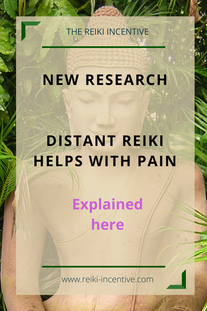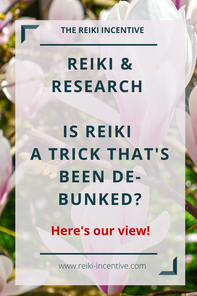|
I’m talking tomorrow briefly in the online Reiki healing summit about how Reiki was so beneficial for me in terms of pain relief when I was unwell with back pain caused by what we call a “slipped” or herniated disc (actually I had three slipped discs, one which required surgery).
In fact it was so helpful to me that it was the turning point which made me take Reiki so much more seriously and make it part of my daily life. Imagine how pleased I was to read the results of some very recent and positive research which looked at Reiki for the pain caused by this condition. Published earlier this year, researchers in Iran compared Reiki to physiotherapy and drug therapy to assess how well each treated the pain and improved patients’ ability to function in daily life. They conducted a clinical trial where they randomised 60 patients into one of three groups:
The study participants had no prior experience of receiving an energy therapy. All groups were judged to be similar in terms of their levels of pain at the start to the trial and in other characteristics. The Reiki group received 3 x 15-minute distant Reiki sessions on three consecutive days. The Physiotherapy group received 7 – 10 sessions of personalised physiotherapy of between 60 and 90 minutes each. The results showed that the Reiki plus medication reduced the severity of back pain and improved the level of activities amongst participants to a greater degree than either physiotherapy with medication or medication alone. The researchers concluded that Reiki is a more cost-effective and faster treatment method than physiotherapy whilst being safe with no known side effects. Wow, this all sounds very positive and encouraging, but it is important to remember that this is only a small trial. Academics appraising this trial would also point out that the trial was not “blinded”. This means that everyone in the group knew what treatment they were receiving - so it is possible that some of the effects felt in the Reiki group were due to positive expectation. No details are given as to how patients were randomised, so we don’t know how effective this was either. But… it is still a good result. What it means for us is that there is yet another small study which again indicates that Reiki may have value for pain relief, however it is not strong enough evidence for us to make claims about pain relief on our websites or other marketing material. We can say however that there is evidence from some small studies which points to the effectiveness of Reiki in the area of pain relief. And of course, we shouldn't fall into the trap of discounting physiotherapy! This is a long standing and proven treatment. It has important benefits, not only in terms of pain relief but also in strengthening muscles, improving condition and reducing the chances of recurring back issues. So Reiki is complementary – it is such a great tool for us to have in our self-care toolbox. It’s something I love using and sharing with others too. How lovely to have another small study to support its value! You can read the full study here: https://www.ncbi.nlm.nih.gov/pmc/articles/PMC5871054/ Reference: Jahantiqu, F et. al. (2018) “Effects of reiki Versus Physiotherapy on Relieving Lower Back Pain and Improving Activities of Daily Living of Patients With Intervertebral Disc Hernia”, Journal of Evidence-Based Integrative Medicine, Vol. 23: 1-5
0 Comments
I was quite saddened recently when I spotted a rather silly article from El País. It went under the title: “Alarm over appeal of pseudo-therapies in Spain - Experts warn of serious consequences if authorities do not take action to counter the growing popularity of treatments like reiki”. It highlights a paragraph in bold which states that Reiki is “simply a trick”. I haven’t seen an article like this for quite a while, one that attacks “pseudo-scientific” therapies and warns of the “dire consequences” for using them. It reports some research done in Spain about attitudes to complementary therapy amongst the general public. Apparently as part of a survey in Spain, people were asked questions “on pseudo-medicine such as homeopathy and reiki for the first time”. The results have been seized upon by the pro-science movement who are concerned that there is confusion amongst the Spanish public about the distinction between conventional and complementary therapy. In the article, Jeronimo Fernandez, Head of the Observatory against Pseudoscience from the Organization of Medical Colleges is quoted as saying: “False information and lack of knowledge – it all gets mixed up. So practices like yoga that truly promotes well-being gets confused with reiki which is simply a trick,” But if you read the article, you’ll see that it mixes together homeopathy and reiki and then simply uses its criticisms of hemopathy as evidence against Reiki. There is no real discussion about reiki or the evidence surrounding it. It uses the banner of science to attack Reiki, whilst being completely unscientific – it’s astounding. Come on El País, we expect better than this! In criticising homeopathy (which they describe as a pseudo-therapy whose efficacy has been debunked) the article shares a concern that people could be buying ineffective remedies “People don’t realize what scientific trials entail and that medicines have to prove they are effective.” It is certainly true that “medicines” by which he means pharmaceuticals really do have to go through some very rigorous clinical research in order to ascertain both their safety and effectiveness. This is quite right. Serious harm can be done if mistakes are made. But not all healthcare interventions are equal (Reiki is not homeopathy) and not all are researched to the same degree or in the same way within conventional care. In the medical world there is something which is known as a hierarchy of evidence. Whilst it is certainly true that clinical trials and the reviews/combinations of a number of trials are considered to be the most robust form of evidence, there are other forms of evidence too. These are also highly useful (and used) by clinicians, for example observational studies, clinical experience and expertise etc. If you are interested to know more about this please sign up for my free course – introduction to research for reiki practitioners. Small amounts of clinical research have been conducted into the benefits of Reiki for quite a number of years now. These trials and other studies have been small and many have not been well reported, which can make it difficult for clinicians to fully evaluate them, but there is certainly enough evidence, either through trials, observational studies or clinical experience for many hospices to incorporate Reiki into conventional care. This doesn’t have to be a “them and us” battle. I was reading just this week about a wonderful charity run by Angie Buxton King who is working with the support of medics to bring Reiki into cancer care settings in the UK. She’s talking more about it on the Reiki Online Summit on 22nd May (make a note in your diary!). It’s so interesting, please do make the time to tune in. Reiki certainly hasn’t been “debunked”. It should be researched, and it is being researched. In 2013 it was reported in the Journal of Advanced Practitioner in Oncology that there is “limited evidence suggesting some benefit for cancer quality of life, pain and fatigue” (1). In other areas, for example anxiety and depression the official view in the UK of the National Institute of Health and Care Excellence is that more reliable studies need to be conducted before it can be accepted as useful OR discarded as useless (2). In other words, in their view the evidence so far is inconclusive. Researchers from the University of Pittsburgh reported in Pain Management Nursing that Reiki may be beneficial for both pain and anxiety and that further more robust research is recommended (3). Positive effects are being found, but the studies are not always reported well enough or conducted with large enough samples for them always to be considered acceptable - yet. Whilst the evidence is limited, different people will have different opinions about it. Some will want to use and explore Reiki, others will reject it – but this is opinion, not science. It’s interesting to note then that according to the Spanish study “those who resort to pseudo-therapies are as happy with the results as patients of conventional medicine” and that “a significant number of the medical profession are in favour of alternative therapies –18.4% of "pseudo-therapists" have the support of healthcare professionals while 14% have been informed about a pseudo-therapy at their health clinic”. So what’s the problem? Their concern is that the effectiveness of bona fide therapies is being undermined and that people seeking relief from a complementary approach put off seeking conventional care which can be dangerous. Would you agree with that? As Reiki practitioners do you ever aim to cure someone or discourage them from seeking conventional medical care? I don’t and I certainly wouldn’t recommend that you do. We’re not competing with pharmaceuticals or other conventional care. We’re offering a complementary approach, not an alternative one, one that supports people to simply feel better. We are complex beings who have complex experiences. We seek relief from life, we seek to cope better, to manage our stress more effectively and to reduce the symptoms of any conditions we may have (many of which are exacerbated when we don’t feel relaxed and in control). “Feeling better” is so much more complex than simple symptom relief. References: 1. Potter, P.J. (2013) Energy Therapies in Advanced Practice Oncology: An Evidence-Informed Practice Approach, J Adv Pract Oncol. 2013 May-Jun; 4(3): 139–151. Published online 2013 May 1. [Accessed: 29/04/2018]. 2. National Institute for Health and Care Excellence (2015). Reiki for Depression and Anxiety. [Online record accessed 29/04/2018]. 3. Thrane, S. & Cohen, S.M. (2014), Effect of Reiki Therapy on Pain and Anxiety in Adults: An In-Depth Literature review of randomized Trials with Effect Size Calculations. Pain Management Nursing, 15(4) pp 897 – 908 |
Author
Angela established the Reiki Incentive for Reiki practitioners who want to see Reiki more widely accepted and to see it reach new people. She enjoys sharing her passion for authentic practice as well as research into the benefits of this wonderful therapy. Archives
May 2018
Categories
All
|



 RSS Feed
RSS Feed
